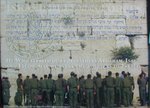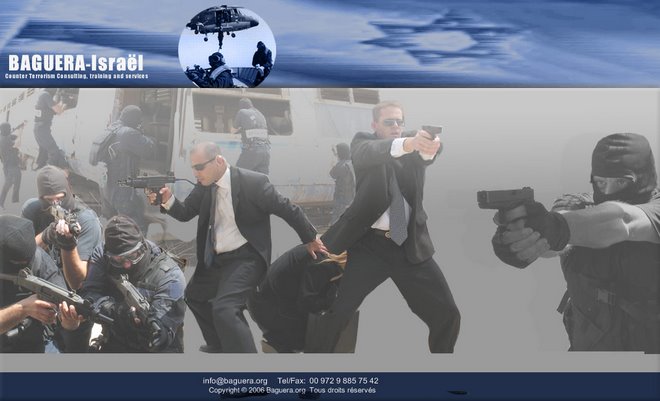Set Your Watch with B'nai Elim Jerusalem Time
Jerusalem On Line - Channel 2 News from Israel
UN Doomsday Treaty With Ginny Simone
14 November 2008
TALKING WITH IRAN' LEADER - PROBLEMATIC
The Problems of Engaging with Iran's Supreme Leader
By Mehdi Khalaji
November 12, 2008Iranian President Mahmoud Ahmadinezhad's congratulatory letter to U.S. president-elect Barack Obama was the first of its kind in the history of the Islamic Republic. In his letter, Ahmadinezhad expressed his hope for fundamental change in U.S. domestic and foreign policies. Although some observers speculate that the letter suggests a transformation in the mindset of Iran's supreme leader, Ayatollah Ali Khamenei, about normalizing relations between Iran and the United States, this is unlikely. Majlis speaker Ali Larijani expressed the widespread attitude of Iranian leaders on November 9, saying, "Whoever thinks that Obama will change the U.S. foreign policy is naive."
Background
The United States has made efforts to reach out to the Islamic Republic's leaders in the past, beginning with Zbigniew Brzezinski's November 1, 1979, meeting with the Iranian prime minister, which led four days later to the seizure of the U.S. embassy in Tehran. These efforts have largely failed, primarily because the United States was attempting to work with Iranian presidents and diplomats, despite the fact that they are not in charge of key foreign policy issues or the nuclear program. Ayatollah Khamenei as the supreme leader and the commander in chief of armed forces has the ultimate supervision over the nuclear program, Iran's military strategy in the region, and Iran's foreign policy in general. Any attempt to reach Iran's government is more likely to be successful if it involves the supreme leader. But Khamenei would have to resolve many paradoxes before receiving any American overture directly.
Isolated but Powerful Supreme Leader
In an October 30 speech, Ayatollah Khamenei reiterated that "the Islamic Republic of Iran's differences with America are beyond political differences and [are] more fundamental than that." He urged Iranians to read the documents seized by students from the U.S. Embassy in Tehran twenty-nine years ago, saying that "the goals of Americans are to deprive Iran of its independence and dignity, cause it to regret the Islamic Revolution, and make it again dependent on and obedient to America." The supreme leader added, "The hatred and abhorrence of Iran's nation toward America is deep."
Khamenei's unapologetic, uncompromising hatred for the United States has remained unchanged, a profound mistrust that causes him to underestimate changes in the U.S. political atmosphere or policy. On the eve of the U.S. election, Kayhan, an Iranian newspaper affiliated with the supreme leader, wrote that "no matter who is elected tomorrow, America is our enemy and our relations with it will remain deadlocked. Why? The reason is found in the essence of the two parties. The Islamic Republic of Iran in its government structure relies on the pure Mohammedan Islam, the main feature of which is fighting injustice, while America has an unjust and imperialist nature."
Although some Iranian diplomats and presidents, whether radicals or reformists, have been interested in opening doors to the United States -- and this would seem to include President Ahmadinezhad, as evidenced by his frequent trips to New York -- Ayatollah Khamenei has been able to sabotage any attempt at serious dialogue.
Leading a Country or an Ideology?
Khamenei considers himself not only the leader of the Islamic Republic but also the highest authority on Islamic ideology in the world. He therefore sees himself as responsible for the survival of Islamic ideology and its values, as well as his image as its leader. Because the Islamic Republic has failed to meet its economic, cultural, and social promises, Khamenei has made anti-Americanism the cornerstone of that Islamic ideology.
"America" for Khamenei does not refer to a country like any other, but rather to a point of view diametrically opposed to Islamic ideology, on which the Iranian regime relies for its legitimacy. In his mind, allowing the level of "hatred" toward the United States to diminish is tantamount to recognizing the supremacy of "Western culture." Such a development would be disastrous for Khamenei, because for the last twenty years Khamenei has lived in fear of a "velvet revolution" -- an infusion of Western culture and values that would lead to the overthrow of the regime. Indeed, this fear has led him to kill or arrest political activists and intellectuals and crack down on civil activists, syndicates, and nongovernmental organizations, because he considers them the West's most effective means of waging a "soft war" against Iran.
In order to accept any offer for direct negotiation with the United States, Ayatollah Khamenei would first have to accept that his position is limited to heading a country, not a broader ideology. This could effect a drastic change in Iran's policy in the region and its diplomacy in general.
Today the Islamic Republic's leadership is arguably in a worse position than at any point in the last three decades due to the country's economic crisis, the leadership's lack of a power base in society, and international pressure on the regime. For some Iranian leaders, this state of affairs might justify taking advantage of the election of a new U.S. president to change the tenor of the bilateral relationship. But there is no evidence that Khamenei is among those officials. Although many Iranians may disapprove of Khamenei as a leader, he has succeeded in expanding his power throughout the Islamic world, especially in the Arab Middle East.
How to Reach Out to the Supreme Leader
Based on past experience, as long as the Iranian supreme leader does not see dialogue with the United States as necessary for the survival of the regime, he will be unlikely to make much effort to alter the status quo. Of course, receiving an offer from the next administration for unconditional negotiations will place Khamenei in a difficult position. He has always tried to portray America as responsible for the strains in U.S.-Iranian relations. Asking him to negotiate would undercut this argument and place the burden of responsibility on him for the lack of dialogue.
Khamenei's management model in the past two decades has been to have as much authority as possible with as little responsibility as possible. The first step for dealing directly with the Iranian government is to make its supreme leader responsible. Addressing him directly and publicly with a call to initiate a dialogue will close the exit doors available to him and require him to make a decision. In dealing with the United States, Khamenei's ideal scenario has been "no war, no peace." This strategy has allowed him to continue the nuclear program and minimize the damage associated with it. Given the fact that Iran could well obtain the ability to produce a nuclear bomb in the near future, the United States has to convince him that the "no war, no peace" strategy will no longer work, and that he has to choose either war or peace.
A bold and direct U.S. offer to Ayatollah Khamenei, such as proposing that a top U.S. official meet with him in his Tehran office, would put Khamenei in a difficult position. It is possible -- although not likely -- that he would accept, especially if he believes that Iran faces a direct threat from economic failure or Israeli attack, or if he thought that American officials would treat him respectfully and end U.S. pressures on his regime. But even if he refused to meet, the United States, having tried to solve the problem through diplomacy at the highest level, would most likely find it easier to reach consensus with its strategic allies to increase sanctions on Iran.
Mehdi Khalaji is a senior fellow at The Washington Institute, focusing on the role of politics in contemporary Shiite clericalism in Iran and Iraq.
Advanced Search
Speaking about the Unspeakable: U.S.-Israeli Dialogue on Iran's Nuclear Program
Iran's 'Unacceptable' Bomb: Deterrence and Prevention in the Age of Terror
Eternal Iran: Continuity and Chaos
Classifying Evil: Bush Administration Rhetoric and Policy toward Rogue Regimes-->
Don't Make Iran an Israeli Issue Patrick Clawson, Forward
Sticks, Carrots, and Nukes Patrick Clawson, The Guardian
How to Talk to Iran Dennis Ross, New Republic Online
PolicyWatch #1324: Raising the Costs for Tehran Michael Jacobson
Confronting the Challenge of Iran: Comprehensive Solutions for a Comprehensive Threat
How to Think about Preventative Military Action against Iran
The Role of Finance in Combating National Security Threats
Pulling Tehran's Purse Stings: Leveraging Sanctions and Market Forces to Alter Iranian Behavior
Related documents are PDF files and require Adobe Acrobat Reader.
The Influence of the Surge on Incident Levels in Iraq
Transcript of Soner Cagaptay's November 19, 2006, interview on CNN-Turk's Burasi Washington (in Turkish)
'Clear, Hold, and Build': The Way ahead in Iraq
The Price Outlook for 2006: A Discussion on Energy Policy
Qualitative Military Edge Determination Process (PDF) The Washington Institute
Major PKK Positions in Northern Iraq: East (JPG) The Washington Institute
Major PKK Positions in Northern Iraq: West (JPG) The Washington Institute
Iran and Central Asia: Major Muslim Ethnic Groups (JPEG) Courtesy of the University of Texas Libraries, The University of Texas at Austin
By Mehdi Khalaji
November 12, 2008Iranian President Mahmoud Ahmadinezhad's congratulatory letter to U.S. president-elect Barack Obama was the first of its kind in the history of the Islamic Republic. In his letter, Ahmadinezhad expressed his hope for fundamental change in U.S. domestic and foreign policies. Although some observers speculate that the letter suggests a transformation in the mindset of Iran's supreme leader, Ayatollah Ali Khamenei, about normalizing relations between Iran and the United States, this is unlikely. Majlis speaker Ali Larijani expressed the widespread attitude of Iranian leaders on November 9, saying, "Whoever thinks that Obama will change the U.S. foreign policy is naive."
Background
The United States has made efforts to reach out to the Islamic Republic's leaders in the past, beginning with Zbigniew Brzezinski's November 1, 1979, meeting with the Iranian prime minister, which led four days later to the seizure of the U.S. embassy in Tehran. These efforts have largely failed, primarily because the United States was attempting to work with Iranian presidents and diplomats, despite the fact that they are not in charge of key foreign policy issues or the nuclear program. Ayatollah Khamenei as the supreme leader and the commander in chief of armed forces has the ultimate supervision over the nuclear program, Iran's military strategy in the region, and Iran's foreign policy in general. Any attempt to reach Iran's government is more likely to be successful if it involves the supreme leader. But Khamenei would have to resolve many paradoxes before receiving any American overture directly.
Isolated but Powerful Supreme Leader
In an October 30 speech, Ayatollah Khamenei reiterated that "the Islamic Republic of Iran's differences with America are beyond political differences and [are] more fundamental than that." He urged Iranians to read the documents seized by students from the U.S. Embassy in Tehran twenty-nine years ago, saying that "the goals of Americans are to deprive Iran of its independence and dignity, cause it to regret the Islamic Revolution, and make it again dependent on and obedient to America." The supreme leader added, "The hatred and abhorrence of Iran's nation toward America is deep."
Khamenei's unapologetic, uncompromising hatred for the United States has remained unchanged, a profound mistrust that causes him to underestimate changes in the U.S. political atmosphere or policy. On the eve of the U.S. election, Kayhan, an Iranian newspaper affiliated with the supreme leader, wrote that "no matter who is elected tomorrow, America is our enemy and our relations with it will remain deadlocked. Why? The reason is found in the essence of the two parties. The Islamic Republic of Iran in its government structure relies on the pure Mohammedan Islam, the main feature of which is fighting injustice, while America has an unjust and imperialist nature."
Although some Iranian diplomats and presidents, whether radicals or reformists, have been interested in opening doors to the United States -- and this would seem to include President Ahmadinezhad, as evidenced by his frequent trips to New York -- Ayatollah Khamenei has been able to sabotage any attempt at serious dialogue.
Leading a Country or an Ideology?
Khamenei considers himself not only the leader of the Islamic Republic but also the highest authority on Islamic ideology in the world. He therefore sees himself as responsible for the survival of Islamic ideology and its values, as well as his image as its leader. Because the Islamic Republic has failed to meet its economic, cultural, and social promises, Khamenei has made anti-Americanism the cornerstone of that Islamic ideology.
"America" for Khamenei does not refer to a country like any other, but rather to a point of view diametrically opposed to Islamic ideology, on which the Iranian regime relies for its legitimacy. In his mind, allowing the level of "hatred" toward the United States to diminish is tantamount to recognizing the supremacy of "Western culture." Such a development would be disastrous for Khamenei, because for the last twenty years Khamenei has lived in fear of a "velvet revolution" -- an infusion of Western culture and values that would lead to the overthrow of the regime. Indeed, this fear has led him to kill or arrest political activists and intellectuals and crack down on civil activists, syndicates, and nongovernmental organizations, because he considers them the West's most effective means of waging a "soft war" against Iran.
In order to accept any offer for direct negotiation with the United States, Ayatollah Khamenei would first have to accept that his position is limited to heading a country, not a broader ideology. This could effect a drastic change in Iran's policy in the region and its diplomacy in general.
Today the Islamic Republic's leadership is arguably in a worse position than at any point in the last three decades due to the country's economic crisis, the leadership's lack of a power base in society, and international pressure on the regime. For some Iranian leaders, this state of affairs might justify taking advantage of the election of a new U.S. president to change the tenor of the bilateral relationship. But there is no evidence that Khamenei is among those officials. Although many Iranians may disapprove of Khamenei as a leader, he has succeeded in expanding his power throughout the Islamic world, especially in the Arab Middle East.
How to Reach Out to the Supreme Leader
Based on past experience, as long as the Iranian supreme leader does not see dialogue with the United States as necessary for the survival of the regime, he will be unlikely to make much effort to alter the status quo. Of course, receiving an offer from the next administration for unconditional negotiations will place Khamenei in a difficult position. He has always tried to portray America as responsible for the strains in U.S.-Iranian relations. Asking him to negotiate would undercut this argument and place the burden of responsibility on him for the lack of dialogue.
Khamenei's management model in the past two decades has been to have as much authority as possible with as little responsibility as possible. The first step for dealing directly with the Iranian government is to make its supreme leader responsible. Addressing him directly and publicly with a call to initiate a dialogue will close the exit doors available to him and require him to make a decision. In dealing with the United States, Khamenei's ideal scenario has been "no war, no peace." This strategy has allowed him to continue the nuclear program and minimize the damage associated with it. Given the fact that Iran could well obtain the ability to produce a nuclear bomb in the near future, the United States has to convince him that the "no war, no peace" strategy will no longer work, and that he has to choose either war or peace.
A bold and direct U.S. offer to Ayatollah Khamenei, such as proposing that a top U.S. official meet with him in his Tehran office, would put Khamenei in a difficult position. It is possible -- although not likely -- that he would accept, especially if he believes that Iran faces a direct threat from economic failure or Israeli attack, or if he thought that American officials would treat him respectfully and end U.S. pressures on his regime. But even if he refused to meet, the United States, having tried to solve the problem through diplomacy at the highest level, would most likely find it easier to reach consensus with its strategic allies to increase sanctions on Iran.
Mehdi Khalaji is a senior fellow at The Washington Institute, focusing on the role of politics in contemporary Shiite clericalism in Iran and Iraq.
Advanced Search
Speaking about the Unspeakable: U.S.-Israeli Dialogue on Iran's Nuclear Program
Iran's 'Unacceptable' Bomb: Deterrence and Prevention in the Age of Terror
Eternal Iran: Continuity and Chaos
Classifying Evil: Bush Administration Rhetoric and Policy toward Rogue Regimes-->
Don't Make Iran an Israeli Issue Patrick Clawson, Forward
Sticks, Carrots, and Nukes Patrick Clawson, The Guardian
How to Talk to Iran Dennis Ross, New Republic Online
PolicyWatch #1324: Raising the Costs for Tehran Michael Jacobson
Confronting the Challenge of Iran: Comprehensive Solutions for a Comprehensive Threat
How to Think about Preventative Military Action against Iran
The Role of Finance in Combating National Security Threats
Pulling Tehran's Purse Stings: Leveraging Sanctions and Market Forces to Alter Iranian Behavior
Related documents are PDF files and require Adobe Acrobat Reader.
The Influence of the Surge on Incident Levels in Iraq
Transcript of Soner Cagaptay's November 19, 2006, interview on CNN-Turk's Burasi Washington (in Turkish)
'Clear, Hold, and Build': The Way ahead in Iraq
The Price Outlook for 2006: A Discussion on Energy Policy
Qualitative Military Edge Determination Process (PDF) The Washington Institute
Major PKK Positions in Northern Iraq: East (JPG) The Washington Institute
Major PKK Positions in Northern Iraq: West (JPG) The Washington Institute
Iran and Central Asia: Major Muslim Ethnic Groups (JPEG) Courtesy of the University of Texas Libraries, The University of Texas at Austin
Subscribe to:
Post Comments (Atom)
Colonel Richard Kemp, British Army - Comment on the IDF's Actions in Gaza
Radical Islams Plans for Western Civilization
THE THIRD JIHAD - WATCH THIS IMPORTANT FILM NOW - FREE
Obama's true agenda...Throw Israel Under the Bus
****Regarding Obama’s Speech before the U.N. Obama has surpassed the peanut farmer Jimmy Carter as the worst and most anti-Israel, anti-Semitic, Arabist President who has ever occupied the White House. Not only is he is a narcissistic moron who is dragging America into an abyss; Obama is the most dangerous threat to World Freedom, Liberty and Western Civilization since Hitler. (Blogmaster)
Senator Joe Leiberman 'Islamist Extremist Regime'
JOHN VOIGHT ON OBAMA'S DISTAIN FOR ISRAEL
CHAZAK CHAZAK
ON THE PATH TO MUSLIM DOMINATION - REVERSABLE? STOPPABLE?
2 STATE SOLUTION - COMMENTARY BY THE "18"
A message to the Jewish people and the entire world
Chronicles I - 16:15-18: "Forever remember His covenant that he commanded forever; That He made with Abraham and swore to Isaac; and confirmed in a decree for Jacob, for Israel, as an eternal covenant; saying to You I will give the Land of Cannan as your alloted heritage"
































 While doing IDF (Israel Defence Forces) reserve duty on a mountain overlooking the
While doing IDF (Israel Defence Forces) reserve duty on a mountain overlooking the 





No comments:
Post a Comment